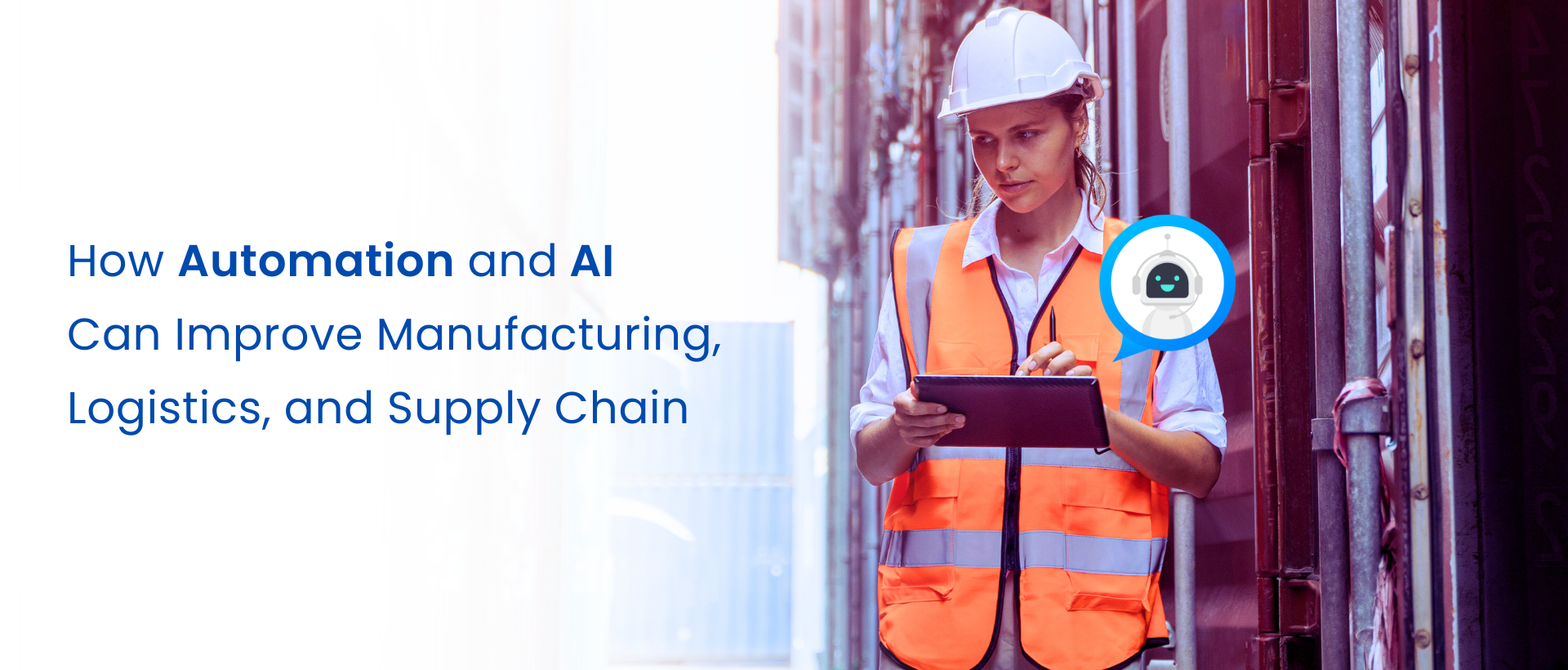
 Grace Catharine
Grace CatharineIt's worth noting that our understanding of logistics and the supply chain has transformed over the past five decades. To ensure accuracy in logistics, research and studies have adhered to a structured classification, presented in chronological order by decade..

Opting for digitalization in the supply chain seems to be the optimal strategy for a company seeking notable outcomes. In the contemporary business landscape, it is imperative to digitize every aspect of the industrial company's entire business cycle, encompassing sales forecasting, supply, production, storage, shipping, after-sales service, and more. Manufacturing, logistics, and the supply chain are in the race towards modernization for better output.

Efficiency plays a role in decision-making, streamlining processes, and continuous improvement. When we integrate Automation with Artificial Intelligence in managing logistics and supply chains it provides optimization capabilities that are essential for accurate capacity planning, refined demand forecasting, improved productivity, cost reduction in the supply chain, and increased output. The recent pandemic has highlighted how uncertainties can significantly impact supply chains and emphasize the need for contingency plans to effectively navigate through challenges.

AI's ability to process and analyze large amounts of data in real-time allows for maintenance and quality control within the supply chain. By monitoring equipment performance and analyzing sensor data, AI systems can predict maintenance requirements, minimize downtime, and optimize production schedules.
Executives are on the hunt to implement AI use cases that can quickly generate significant value from AI automation. Several such opportunities hit that sweet spot, so it's no surprise that demand for them will heat up in the coming year.
Our global research findings provide evidence of AI being smoothly integrated into supply chains. Among over 700 high-performing companies, constituting 12 percent of our sample and spanning diverse industries, these outperformers have exhibited remarkable financial prowess, boasting annual revenue growth and profit increases surpassing 5 percent over the last three years. Public-sector organizations were evaluated based on effectiveness and efficiency.

An overwhelming 88 percent of the surveyed top-performing entities acknowledge the inevitability of artificial intelligence in their industry, with an even more staggering 95 percent deeming AI as central to their innovation success.
Chief Operating Officers (COOs) and Chief Supply Chain Officers (CSCOs) are turning to artifical intelligence and cognitive computing to surmount end-to-end challenges within supply chain processes, with financially successful organizations leading in AI investments. The focal points of these investments include material quality, preventative maintenance, and comprehensive risk management spanning supply to production to customer provisioning.
Machine learning has transitioned into the mainstream of operational technology portfolios, with baseline forecasts for new products playing a pivotal role in shaping product introductions and go-to-market strategies.
AI's application to demand signals enables the identification of evolving demand behaviors, optimizing inventory levels, and refining replenishment plans in the perpetual cycle of product life-cycle management.
Sales and operations planning, the pinnacle of collaborative decisionmaking, benefit significantly from AI technologies. These technologies leverage massive data pools within the supply chain to navigate demand volatility, address supply constraints, streamline production scheduling, and facilitate dynamic distribution. AI complements human interactions by efficiently allocating resources, assigning tasks, and scheduling processes.
Within the realm of manufacturing, collaborative robots equipped with AI capabilities demonstrate a remarkable ability to "see" and navigate their environment safely, working alongside human counterparts in production.
IBM Research delved into distinct aspects of supply chain management, posing inquiries about the priorities, plans, and purpose underlying the adoption of AI capabilities in three complex areas:
The supply chain is a permanent work in progress. Every day, you and your team work hard to make every link function at peak performance. But every day, there are disruptions, errors, and bottlenecks. The fact is, you can't see everything, you can't predict everything, and you can't optimize everything.
But automation infused with AI can get you a whole lot closer.
UiPath took an in-depth look at the many ways automation can build on what you've already achieved with your supply chain. Software robots take some of your most tedious work off your plate while opening entirely new possibilities.
These priorities encapsulate the prevailing business challenges and competitive trends shaping companies' operations. The plans outline ongoing and future investments in technology, processes, and human capital over the next three years. Lastly, the purpose delineates the initiatives, with a focus on intelligence, that executives prioritize to yield the highest return on their investments.
Most importantly, if your day-to-day processes are not automated, the results won't be friendly. So go for task mining, process mining, and then AIinfused automation.
There are several tools and companies to evaluate, like UiPath, IBM, SAP Signavio, and many others.
Ennuviz is a company that specializes in transformation, bringing in over 50 years of industry experience. We are experts in assisting businesses with known tools, like UiPath, SAP Signavio, and IBM in their systems. By doing they can optimize their processes. Fully harness the potential of their technology. Our team of experts is well-versed in software advancements ensuring that we deliver solutions tailored to our customers' specific requirements. We understand the significance of secure tool integration. We are there to support you at every step. Rest assured; with our assistance your business will maximize the benefits derived from your existing technology.
Thanks for reading my article. Your thoughts will be very useful.

Ajay Sharma
Because we put you first. Our customer-obsessed working model honors client's needs.
Schedule Demo